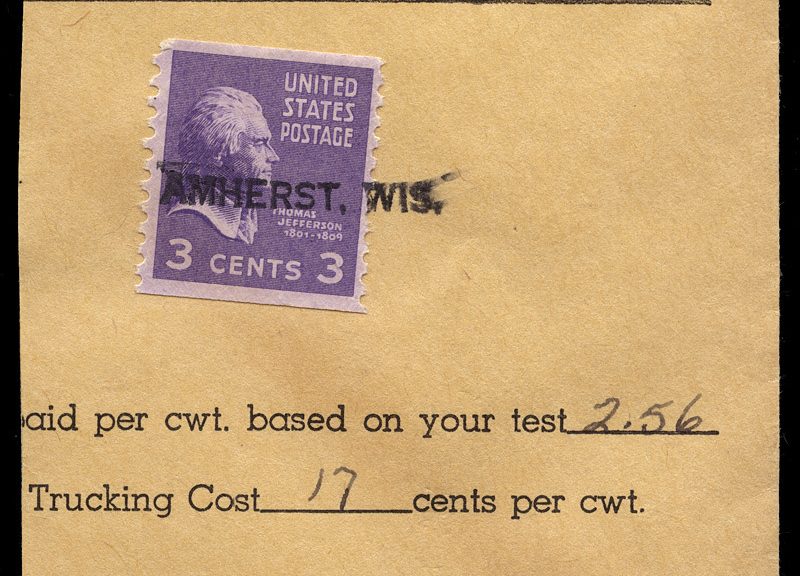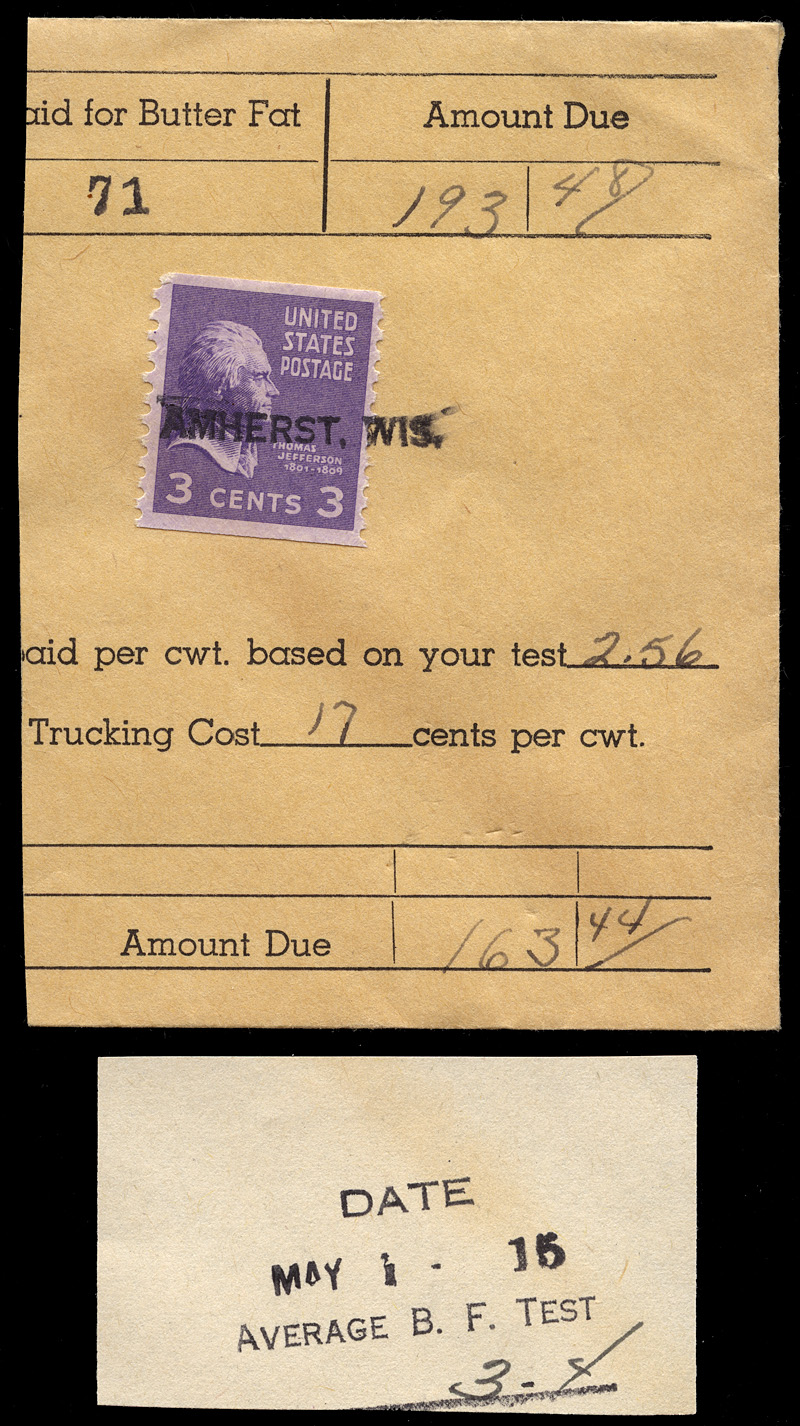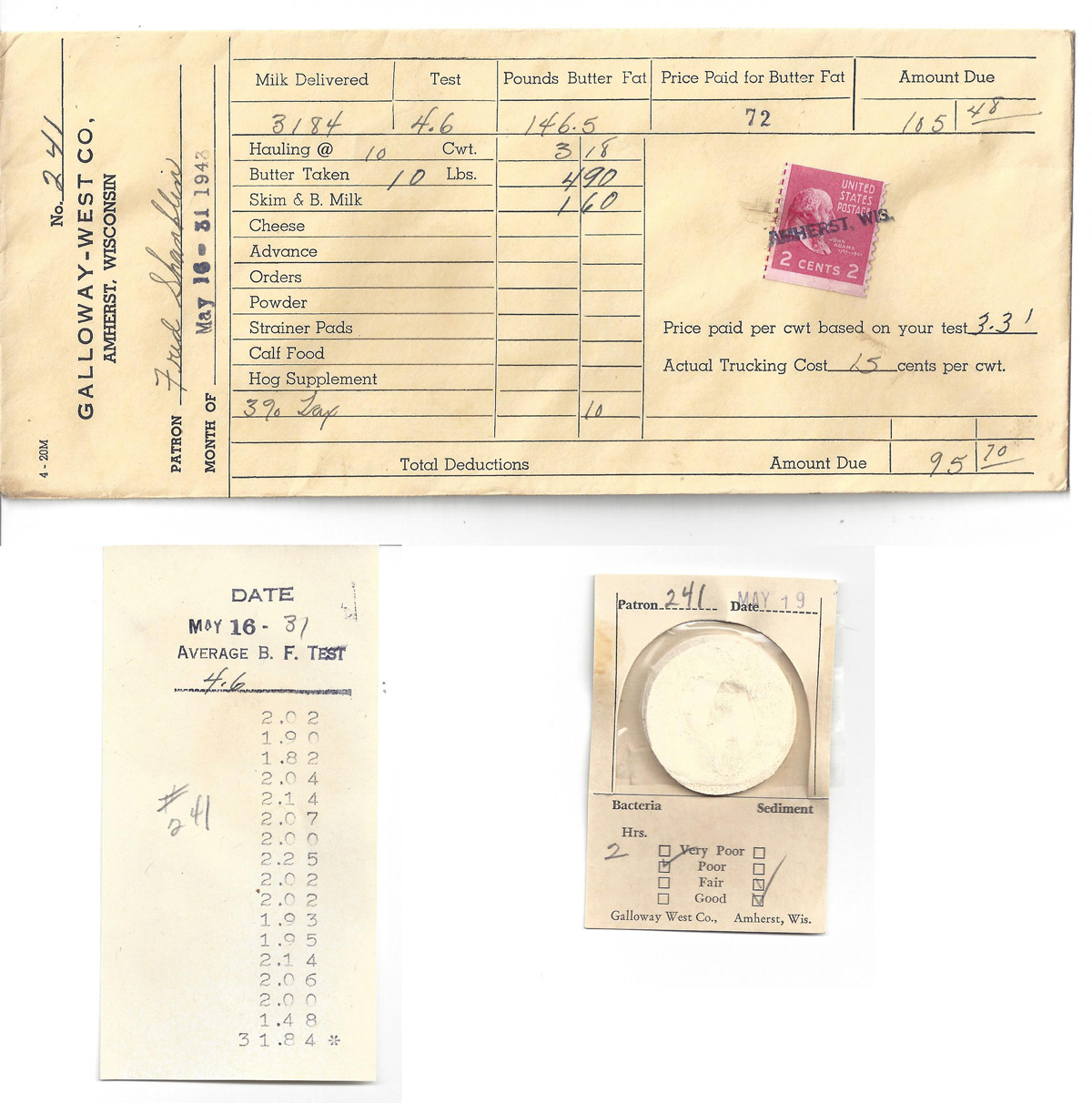
Butter fat revenue usage?
A gentleman at the local show yesterday had two of these, that he believes to be postage improperly used as revenues.
There was one with a 2-cent coil affixed, and this one with a 3-cent coil affixed, both on these partial envelope remnants and both with the same straight line handstamp. He offered me one gratis and I chose this one, as it also had the little slip shown below contained inside it.
What exactly is this and what is the stamp paying? Is it really a revenue usage?
Reply from Bart Rosenberg:
All but guaranteed to be a postal use of some kind. Postal cancel, oleo tax was 1/4 cents per pound and paid on the product containers, and this appears to be part of a trucking company receipt. No possible way I can think of for an amount that small to be a revenue usage here. Perhaps Ron will chime in, he knows far more about oleo taxes than I do… Since it is an envelope, there was probably a window with the address printed on the paperwork inside, which was then presumably sent to the home office.
Subsequent reply from Ron Lesher:
I agree with most of the comments that this is not a revenue use. The two rates were 1/4 cent per pound for uncolored margarine and 10 cents per pound for colored. The federal tax on oleo expired June 30, 1950. It seems likely that Wisconsin did not permit the sale of oleo during the time period when the Prexies were in service. The suggested test on butter fat for the making of cheese in Wisconsin seems like a plausible explanation, but I see not evidence that it is the state doing the testing. Further I see no evidence that a tax is being paid. Perhaps a receipt for truck transportation?
About 2 years later, a dealer contacted me with another example, this one being the complete envelope, along with some collateral material contained within it. There is nothing printed or written on the back of the envelope, and the envelope has never been sealed.
I still see nothing that indicates a postal use, but we now have a full date.
Comment from Bob Hohertz:
Count me in as saying these paid a postal purpose – take them across town and dump them in the company’s mailbox, so the PO said you have to put postage on them. They can’t pay a state tax – the state would never let the Feds have their tax money, which is exactly what happens if one pays the PO for a stamp. And so far as paying a Federal tax, remember when Kilmer tried to put postage stamps on his medicines in 1898, overpaying the tax? The Feds told him to take them off – tax money was going to the PO rather than the IRS.
Postage stamps have been used to attempt to pay taxes. You’ve seen the ones on stock certificates of a particular user (I have a couple of those) in the Prexie era. But it’s a one-time attempt, not systematic over time.
I know that Len P. intends to use one of these in an exhibit on postage paid for carriage outside the mails.
Follow-up 6 months later, Terry Kurzinski, the dealer who sold the envelopes on eBay, wrote an article about these in the March 2018 issue of The United States Specialist, entitled “New Find: Prexie Used ‘Out of the Mails’.” Included in the article, someone who purchased one of the covers from Terry on eBay contacted the Galloway Co., which is still in business, and was able to get some historical context to the envelope and slips.
Additionally, in a later issue, a member submitted as a letter to the editor, the original ruling that applies to Milk Checks, as printed in the February 20, 1936 Postal Bulletin:
MILK CHECKS. A check given in payment for milk is not a “letter” within the meaning of the private express statutes. If the check shows upon its face for what purpose it is issued, i.e., pounds of milk for which payment is being made, quality, test, price per pound, etc., it would still fall within the category of “commercial papers”; however, such data must be a part of the body of the check itself. Milk checks in this form may be delivered by contract milk haulers, or by any other method suitable to the sender outside the mails without the payment of postage.
However, a milk statement or settlement sheet, giving information relative to weight of the milk, quality, butterfat contents, deductions for hauling, price per pound, etc., when forwarded along with the milk check for the producer’s information and retained in his possession, is a “letter” within the meaning of the private express statutes.
KARL A. CROWLEY, Solicitor

